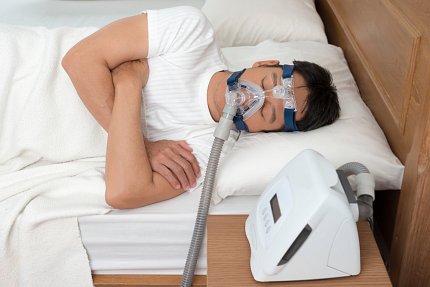Sleep Apnea Associated with Increased Risks for Long Covid

Photo: sbw18/shutterstock
Among people who have had Covid-19, adults with obstructive sleep apnea were more likely to experience long-term symptoms suggestive of long Covid than those without the sleep disorder, according to a large study supported by NIH. In fact, multiple analyses of electronic health records (EHR) uncovered adults with sleep apnea may have up to a 75% higher risk of developing long Covid. The findings, part of NIH’s Researching Covid to Enhance Recovery (RECOVER) Initiative, published in the journal SLEEP.
Long Covid is an umbrella term for one or more symptoms that people can experience for weeks, months or years after a Covid-19 infection.
Obstructive sleep apnea occurs when the upper airway becomes blocked during sleep, which interrupts breathing. The condition affects about 1 in 8 adults but is often underdiagnosed.
The research, which came from EHR data of more than 2.2 million Americans with Covid-19, suggests close monitoring after a Covid infection may help adults with sleep apnea. The findings may also strengthen understanding of why some people are more likely to develop the post-viral syndrome after acute infection.
“We still have a lot to learn about the long-term effects of this virus, but this study could inform clinical care by identifying patients who may benefit from closer monitoring,” said Dr. Marishka Brown, director of the National Center on Sleep Disorders Research at the National Heart, Lung and Blood Institute.
“People with obstructive sleep apnea should also keep up with their vaccinations to minimize the risk of infection,” said the study’s senior author Dr. Lorna Thorpe of New York University’s Grossman School of Medicine.
Data for the analysis came from three RECOVER networks: the National Covid Cohort Collaborative, which included 1.7 million adults; PCORnet, which included 330,000 adults; and PEDSnet, a pediatric-focused research network participating in PCORnet that included 102,000 children. All participants included in this analysis had tested positive for Covid-19 between March 2020 and February 2022.
